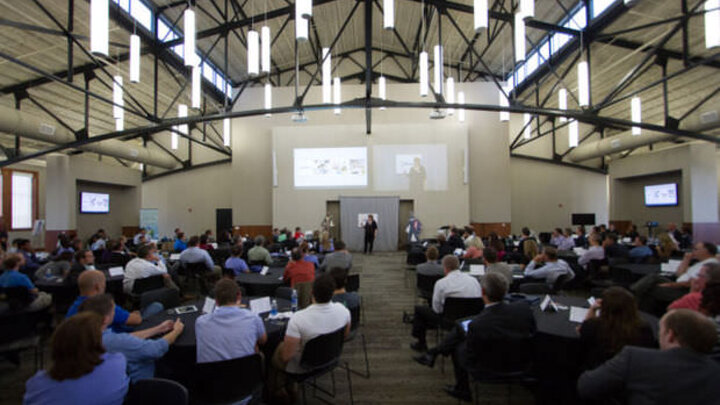NMotion's 2014 startup class show their stuff

Here are notes on the 2014 class of startups guided by NMotion, the University of Nebraska's startup accelerator in Lincoln. The companies gave demonstrations to a crowd of about 350 at Innovation Campus this week.
MusicSpoke
Team: Husband and wife, Kurt Knecht and Jennifer Rosenblatt, Lincoln.
Quick pitch: Helping composers keep more revenue from their work through an online marketplace.
Traction: 8,000 web page views, sales increased 245 percent, keeping 30 percent of every sale -- without paying for advertising, yet.
Notes: The book industry has changed. The music industry has changed. Sheet music has not changed. The traditional sales model involves long ship times, hard-to-find items and publishers keep 92 percent of the profits. MusicSpoke is the world’s largest marketplace for sheet music distribution and allows composers to keep more. Kurt Knecht is a composer.
QuantifiedAg
Team: Vishal Singh, Lincoln.
Quick pitch: Sensors and data platform for the cattle industry.
Traction: Letter of intent from feedlots representing 32,000 head of cattle. Got a prototype grant to create the data-tracking device.
Notes: Uses Fitbit-like tech to take the guesswork out of identifying sick cattle. Also tracks weather data, temperatures, the movement of a cow and more. There are more than 4.5 million sick cattle every year, with 2 percent mortality. That's $3.2 billion in annual losses from just the feedlots, not counting dairy or rangeland cows. Revenue comes from subscription service and the purchase of sensors.
The company pivoted from using drones. “It made sense to piggyback onto a process that feedlots already do (tagging cows). We just add a chip into the tags.” Used to be called PixoBot.
Mowdo
Team: Mike Fingado and Brian Dzingai (both former Florida State athletes), Seattle and Chicago, respectively.
Quick pitch: Mobile platform providing on-demand lawn care. The Uber of lawn care.
Traction: With a $20.5 billion-dollar market, the potential is big. They’ve signed up and arranged mowings for customers in nine states with signups in 20 other states. On average, the cost is $45 per lawn, twice a month. They’re exploring more lawn services, like leaf removal, fertilization, aeration and more. Adding those markets makes it a $74 billion industry. They’ve got paying customers.
Notes: Mowdo pivoted from Athletepreneur, a program that aimed to help former college athletes and train them to become entrepreneurs through mentorship, events and more. Dzingai is a former Olympic runner. The pair from Seattle and Chicago are heading south for the winter to gain new markets that need lawn care year-round.
Fanstreamm
Team: Jason Kristufek, Cedar Rapids, Iowa.
Quick pitch: Group ticketing for sports and entertainment venues made easy.
Traction: Fanstreamm created a mobile app for the Lincoln Saltdogs baseball team and is working with the Lincoln Stars hockey team. With more than 15,000 minor league venues, Fanstreamm has a lot of potential teams and a $5 billion market to work with.
Notes: Fanstreamm hopes to take the headache of organizing, buying and getting paid back out of group ticketing. “It shouldn’t take 33 text messages, 12 emails and five phone calls to organize only to have four people not show up and you’re out $45.” More than 43 percent of tickets go unsold at an average minor league game.
Fanstreamm pivoted from Turnstile Cards, which was created during a startup weekend and aimed to create digital baseball cards.
oneCanvas
Team: Stacy Carlson, Lincoln.
Quick pitch: Graphics engine for digital scrapbooking and photo books. “All-in-one graphic design software.”
Traction: With monthly subscriptions as the main revenue driver, oneCanvas has already validated the idea before going into development. Potential customers include photographers, real estate agents and web design firms. Carlson said there isn’t a good mobile solution for digital scrapbooking -- Photoshop is too complicated for most. There are more than 22 million digital scrapbookers in the U.S. and they spend $2.4 billion a year.
Notes: oneCanvas started out as DigiWidgets, a web customization program that won Jumpstart Lincoln. The DigiWidget teams, Carl Steffen and Stacy Carlson, split. Carlson, who has already had traction in the digital scrapbook space before, created oneCanvas. Steffen continues to run DigiWidgets.
Commissioner
Team: Kunwar Gill and Richard Bansel, Toronto, Canada.
Quick pitch: Analytics and player evaluation software for coaches and athletes.
Traction: Signed up 6,000 beta users in a week. Subscriptions run $10 a month. Obtained a Nebraska prototype grant to build the product.
Notes: Commissioner is a mobile app for coaches, parents, clubs and players to track progress on certain skills. Right now, Commissioner is focusing on youth soccer, since it’s the largest youth sport with an average of $5,000 spent per year, per player.
Adolade
Team: Ryan Cooper, Lincoln.
Quick pitch: Mobile rewards platform enabling brands and mobile developers to monetize in-app experiences.
Traction: Signed up his first customer, former Husker quarterback Taylor Martinez, who is using the ad/rewards platform on his new mobile game, Stupid Fast. The mobile ad market will be a $42 billion industry by 2017.
Notes: About 99 percent of developers find apps unsuccessful because they don’t retain users or can’t monetize. Adolade hopes to move mobile ads forward by making them more effective through a moment-based approach that captures users in their most engaged times, like when they get a high score in a game. Advertisers can then offer a deal or sample product. More than 85 percent of people in a survey said they like that type of interaction more than a banner ad.
This is Cooper’s second startup. His first was a similar rewards program for golfers called Golf Status.
Article by: Jordan Pascale, Silicon Prairie News
